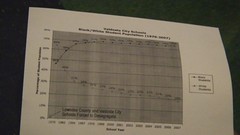I completely agree with Alex Rowell. What is the purpose of consolidation/’unification’? Is the purpose to desegregate the two school districts? If so, how will the new school district deal with the issues that Leigh Touchton brings up with regard to education not serving black male students. How will a larger school district better meet the needs of a much more diverse student body? Furthermore, What do the parents in the county think about desegregation of their distict? (Because if they don’t want it, there is no doubt that ‘unification’ will be a disaster for ALL)CUEE’s own study says unification wouldn’t save money and CUEE’s own expert consultant said:OR is the purpose to reduce cost by reducing administrators in the head office? If that is the purpose where are the students in this decision.
-Karen Noll
“If you believe in the end that running one system is cheaper than running two school systems. If in the end you are going to cast a vote for a single system because you think it would save money, I wouldn’t cast my vote. I do not think it will save money.”And, indeed, where are the students in this decision?
-jsq







